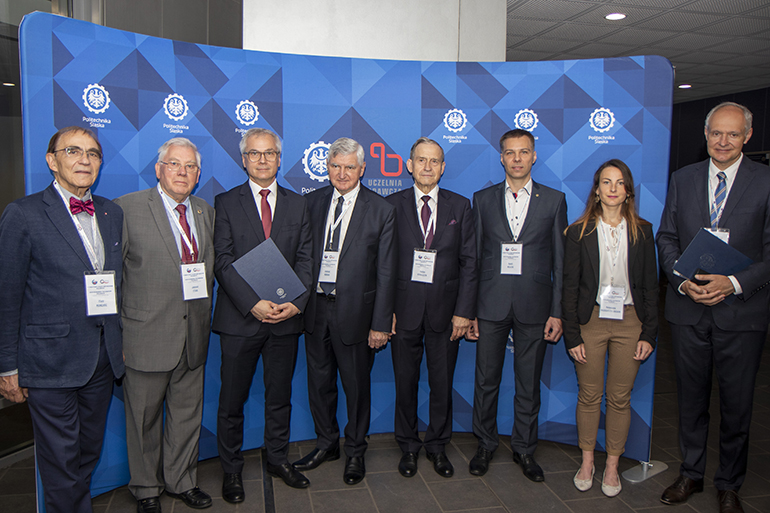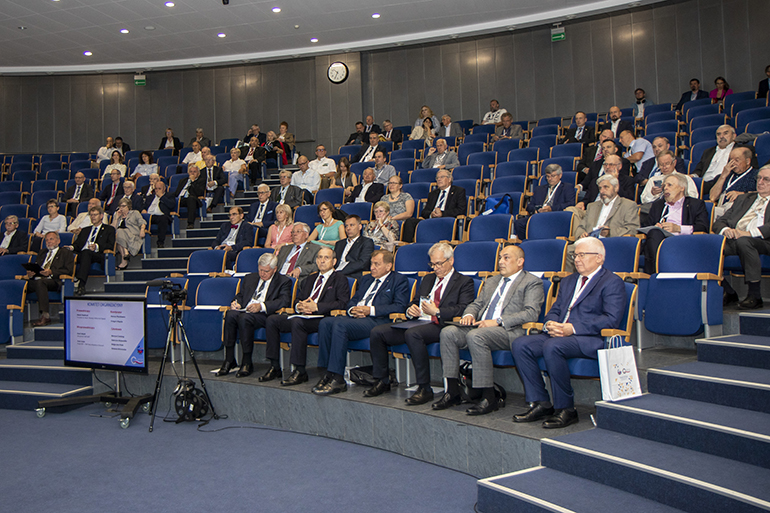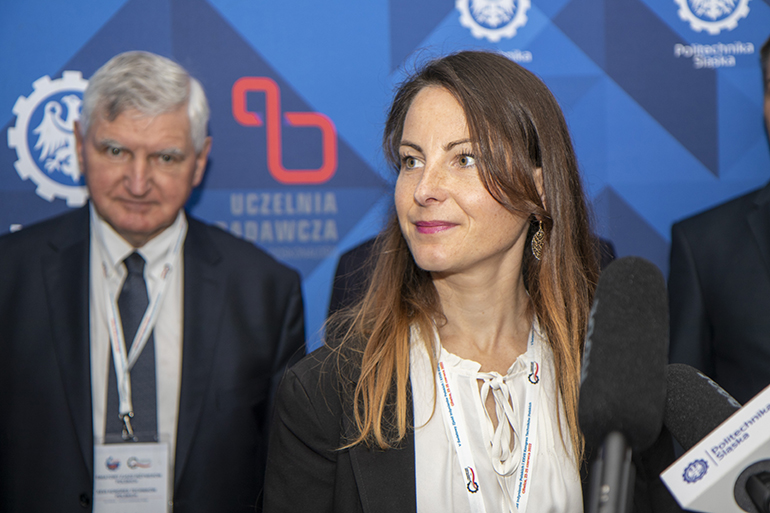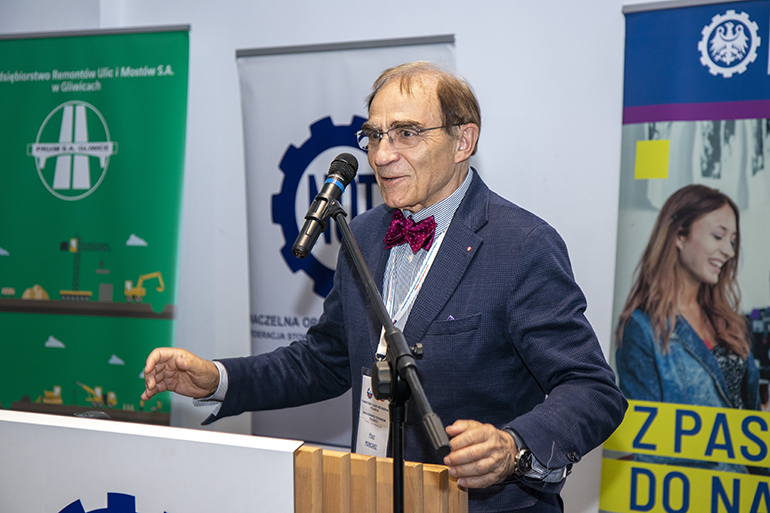Start - Aktualności - World Congress of Polish engineers

World Congress of Polish engineers
Polish engineers and technicians who work both in Poland and abroad and also in the United States, France, Germany and Lithuania - have come to the Silesian University of Technology for the 5th World Congress of Polish Engineers and the 27th Congress of Polish Technicians.
Panels and thematic debates are held from Thursday morning to Friday afternoon - in the Education and Congress Centre. Students and scientists of the Silesian University of Technology are also invited to participate in the meetings.
This year's leading theme of the congress is the widely understood activity of engineers for the protection of health and the natural environment. The slogan of the event is "Engineers for a healthy planet". The participants of the meeting will discuss the most important global social and civilisation needs and present the research they conduct in scientific centres all over the world.

- This meeting provides an opportunity to exchange experiences, views and to reflect on the future and the challenges facing research teams and engineers, in the context of climate and environmental protection. This subject is particularly important for us, as the Silesian University of Technology addresses this subject in its Priority Research Areas," said Professor Arkadiusz Mężyk, Rector of the Silesian University of Technology, during the press conference.
The rector added that an event with a strong tradition, such as the 5th World Congress of Polish Engineers and the 27th Congress of Polish Technicians, for the first time is taking place in Gliwice - a place of science and technology. - Apart from the Silesian University of Technology, institutes of the Polish Academy of Sciences, the National Institute of Oncology, institutes of the Łukasiewicz Research Network and a very large social and economic environment are also present here - emphasised Prof. Mężyk.
In the absence of the President of the Polish Federation of Engineering Associations - Chief Technical Organisation (FSNT-NOT), Ewa Mańkiewicz-Cudny, the role of co-host was performed by the Vice President Stefan Góralczyk. - I am glad that we can meet again - all friends, specialists from all over the world, engineers, professors, in order to exchange experiences and establish cooperation, also to strengthen bonds of friendship - he emphasised.
Meanwhile, Janusz Ptak, Secretary General of the European Federation of Polish Scientific and Technological Societies Abroad, pointed out that his organisation represents a group of several hundred engineers, scientists and technicians in Europe, from many countries.
Polish scientists, who are active overseas are brought together by the Council of Polish Engineers in North America. According to its president, Prof Andrzej Nowak, the organisation has representation in New York, Chicago, Silicon Valley in California, and also at several centres in Canada.
- We aim to bring the scientific and technical communities at home and overseas closer together. The idea is for both sides to become better acquainted with each other's capabilities and realistic expectations. Past reunions have been of great help in this regard - stressed Prof Nowak.
Prof Piotr Moncarz from Stanford University was also present among the guests. - This is the great event we dreamed of when we set up the Polish-American cooperation and exchange organisation in Silicon Valley - an organisation for building bridges between centres of technical and scientific knowledge - in Poland and those scattered around the world - said Prof Moncarz.
The Vice Rector for Science and Development of the Silesian University of Technology and the chairman of the congress organising committee, Prof. Marek Pawełczyk, assured that the Silesian University of Technology creates the best possible conditions for cooperation, exchange of ideas and a good atmosphere - maintaining this cooperation between the Polish people working in Poland and abroad.
Kamil Wójcik from FSNT-NOT also drew attention to this transfer of knowledge between Polish people working in Poland and those working abroad. - We have representatives from Germany, Lithuania, France, Canada and the United States - this transfer, the exchange of experiences by the Poles who have already achieved a certain success and can share it, is the greatest essence of these congresses - he said.

An excellent example of a Polish scientist who works both in Poland and abroad is Małgorzata Włodarczyk-Biegun PhD, from the Biotechnology Centre at the Silesian University of Technology. Her research group is involved in 3D bioprinting from scaffolds, or cell derived matrices, which could be useful in tissue engineering and regenerative medicine. - We build very fine structures that will serve precisely as the basis for cell growth; they replicate natural structures in the human body. In particular, we are interested in the connection between hard and soft tissues, i.e. the connections between bone and muscle, for example, because these structures, when they are damaged, e.g. during an accident or during practising sports, are very difficult to regenerate and reconstruct naturally - said Włodarczyk-Biegun PhD.
In addition, representatives of associations of Polish engineers working abroad shared their insights on the opportunities for Polish scientists to achieve scientific success abroad

Professor Piotr Moncarz of Stanford University said: - If we keep saying that Chopin was Polish, people will stop listening to Chopin. Let them listen to Chopin and then we will tell them that he was Polish. The approach to the invention has to be adapted to the reception of the market. First, we need to identify the problem and then solve it. Rather than have a solution and then be upset with the world for not waiting for that solution, which of course is brilliant," he said.
Prof Moncarz added: - 'Indeed, our graduates from Polish universities are well prepared content-wise for further development, while it is still quite a long way from content-wise preparation (even from getting a doctorate under Prof. Andrzej Nowak), to emerge, not as a well-functioning screw in the mechanism of technology corporations, but as a leader. Here you have to work twice as hard, care about the quality of your public image and slowly move forward. There are plenty of examples like this. As well as plenty of examples of those who "got off" along the way and then resent the whole world for failing to notice them. This is not the way to win," evaluated the scientist.
He also added that a scientist needs to get out of his lab and make himself visible. - It is necessary to search for the pathways that link science and the economy, he stressed.
Congresses of Polish Engineers that gather Polish engineers together have been organised since the 19th century. The first one was held in 1882 and was attended by engineers from the three partitions of Poland and emigration. An important objective of the engineering meetings was and still is the integration of the environment and the exchange of knowledge and experience. This tradition was revived in the 1990s with the "Poles Together" symposia organised by FSNT-NOT. The first two symposia were held in Warsaw, followed by others in London, Vilnius and Vienna. Following these, Polish engineers living and working outside the borders began to establish contacts with Polish universities, research institutes and innovative enterprises.
This raised the importance of the meetings organised, elevating them to the rank of a congress. In September 2010, FSNT-NOT, the Warsaw University of Technology and the Council of Polish Engineers in North America organised the First World Congress of Polish Engineers (SZIP) in Warsaw, which attracted about 500 Polish engineers from Poland and abroad. It was then decided that the world assemblies of Polish engineering professionals would be held every three years.
The programme for this year's congress includes several thematic panels and discussions, covering topics such as: "The role of engineers in a post-COVID-19 pandemic world", "Will artificial intelligence dethrone humans", "The future - hydrogen energy or another one?", "Does society need a technical culture?", "Space research".
Students and researchers from the Silesian University of Technology are also invited to attend. The debates take place until Friday afternoon. Full programme on the event website https://www.szip.org.pl/program/
Link to the photo gallery Politechnika Śląska | V Światowy Zjazd Inżynierów Polskich (polsl.pl)
For more photos go to: Politechnika Śląska | V Światowy Zjazd Inżynierów Polskich (polsl.pl)








